

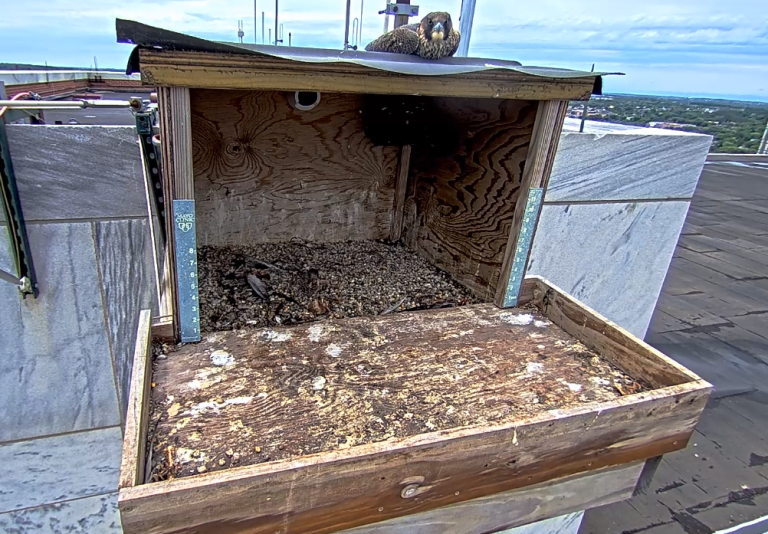
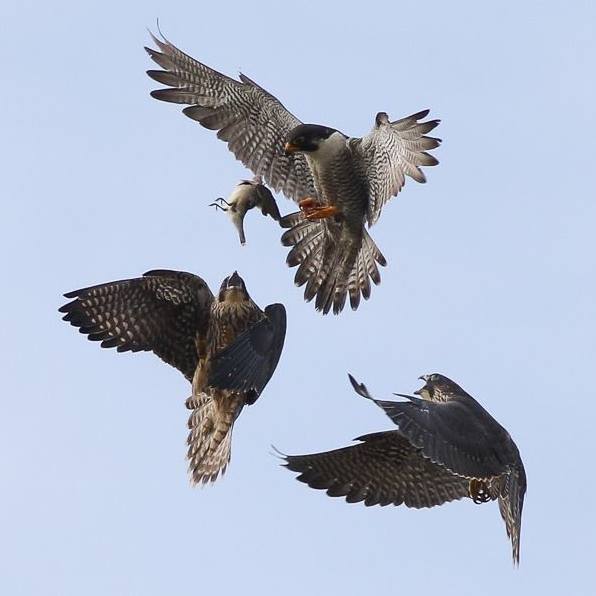
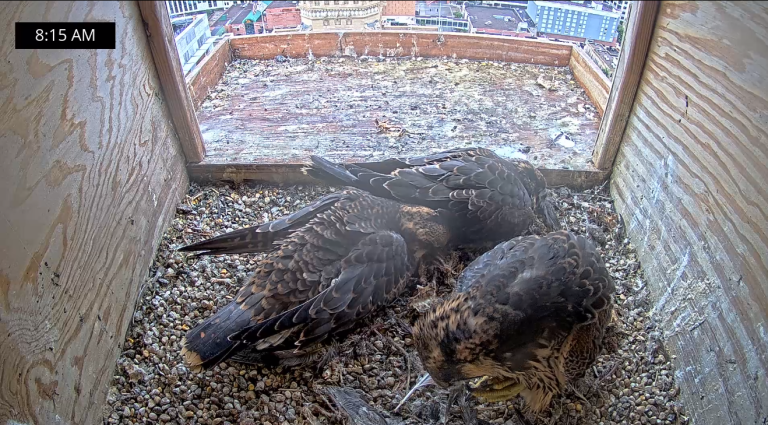
We are on day four of fledgling life, and what an adventure it has been! I spent the day in Rochester yesterday, looking for the fledglings, which you can imagine would be like looking for a needle in a haystack.
Due to the rain and cooler weather, the fledglings stayed lower in the air and perched on buildings, versus soaring high over a greater distance in downtown Rochester. Adira and Onyx were spotted immediately on the Plummer Building, which is directly across from their nestbox, while it took me about half an hour to find Heritage, who was to the north on the Kahler Hotel, about a block away. The three sat for over 2 hours preening or sleeping, but that was most likely due to the rain more than anything. During breaks in the rain, the three took to the air, chasing the adults who happened to be nearby or when they had food in their talons.
As you might imagine, when food was visible, the three immediately took chase after the adult and things were LOUD with fledgling screeches. Onyx happened to catch a pigeon in a mid-air transfer from Hattie, while the other two chased her, hoping to get a piece of the prize. Onyx won out and was eventually able to eat in peace, while Adira and Heritage took off to chase Orton, even though he had empty talons. Orton easily out-flew the fledglings, which gave up and went back to where Onyx was perched, with her full crop.
Throughout the five hours I spent on campus, it was apparent that Heritage was most often sighted alone while Onyx and Adira spent the most time together, either seeking out refuge from the rain in the box or perched together. Heritage spent time either alone or with Hattie nearby. When the three fledges were apart, each group had an adult falcon within a block of their position, watching over them for any nearby dangers. A Red-tailed Hawk made the mistake of approaching Heritage on the corner of the Hilton Building, which spurred Hattie and Orton into action and quickly drove the hawk out of the area and out of view.
With high temperatures and winds expected today, the falcons won't be spending a lot of time in the air. I'll return to Rochester early Monday morning to do more observations and report back with my findings. Until then, I'll be watching the camera in hopes of a visitor appearing on screen. Jackie
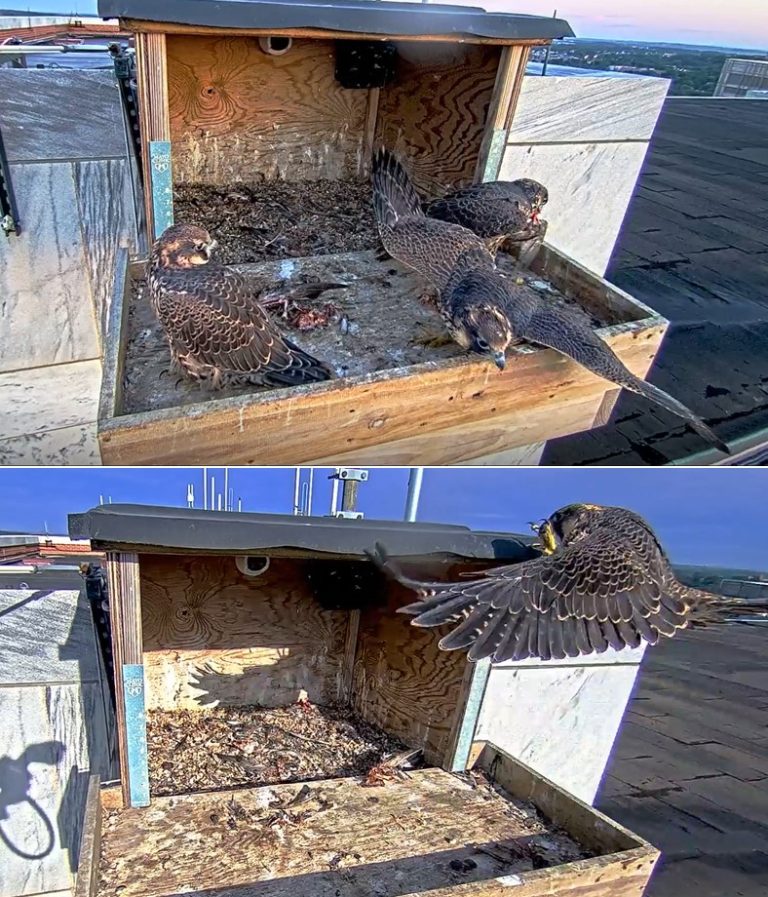
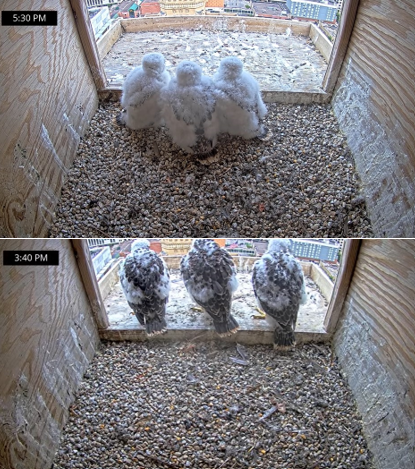
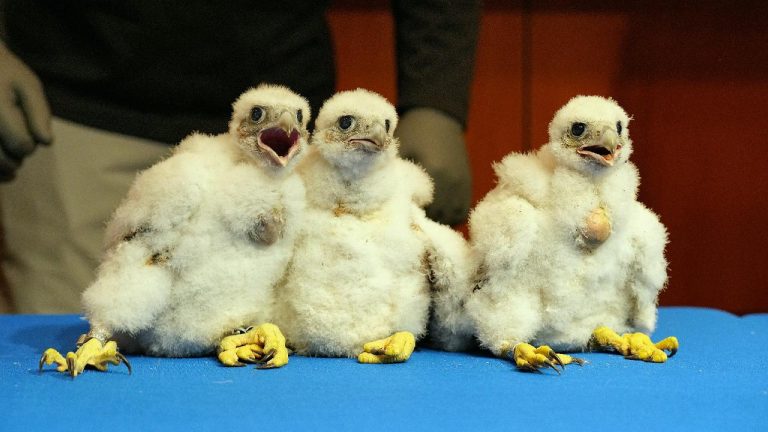
We had a beautiful day for the banding today, for the three nestlings that were 19-20 days old. This is a perfect age for banding because you can determine their sex fairly easily, they don't know how to really use their defenses (beak and talons), and safe because they really can't coordinate their movements very well.
When we band the nestlings here, it takes a significant amount of help to accomplish all of the tasks: someone to keep the chicks in the box and off the front deck, remove the chick from the box, and then transfer it into the specially designed transport carrier. We also need several people to protect the team removing the nestlings from the box from the adults, who obviously are not too happy about removing the nestlings from the area for the banding.
During the actual banding event itself, we have one person remove a nestling from the carrier, while I band, examine, weigh and record all of the information. Once we finish all of that, we have special guests who select the name from a basket, and assign the chick their "name". Lastly, photos are taken of the chick before they are placed back into the transport carrier. We do this for the entire brood of chicks, answer a few questions, and thank everyone for attending. The chicks are then quickly returned to the rooftop nest box, where the adults are waiting nearby.
This year, there were three females, each weighing a little under two pounds, found to be in excellent health and free of any parasites. The names chosen by the team were Onyx, Adira, and Heritage. The first two names were submitted by over 930 people, while the third name was chosen to honor the Heritage Program on its 25th Anniversary, which is the program that now oversees the falcon program. In the photo, the nestlings from left to right, are "Heritage", "Onyx", and "Adira".
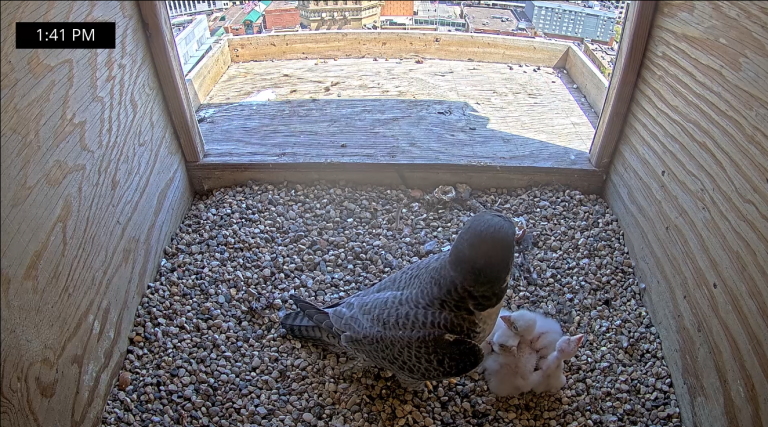
As many of you have noticed, the smallest and youngest chick passed away this afternoon.
There are numerous reasons why this may have happened, but we will never know the true reason for this death. This is a live video feed of wild peregrines raising their young. There are life and death struggles that occur in the natural world, and the camera feed gives us a unique view into this aspect of nature. The decision not to intervene was made for the welfare of the species overall, and the team believes it was the appropriate decision.
We hope our viewers can appreciate this chick’s life but move forward and celebrate the remaining three nestlings that are robust, alert and active in the days and weeks to come.
Jackie and Mayo Clinic Peregrine Falcon Team
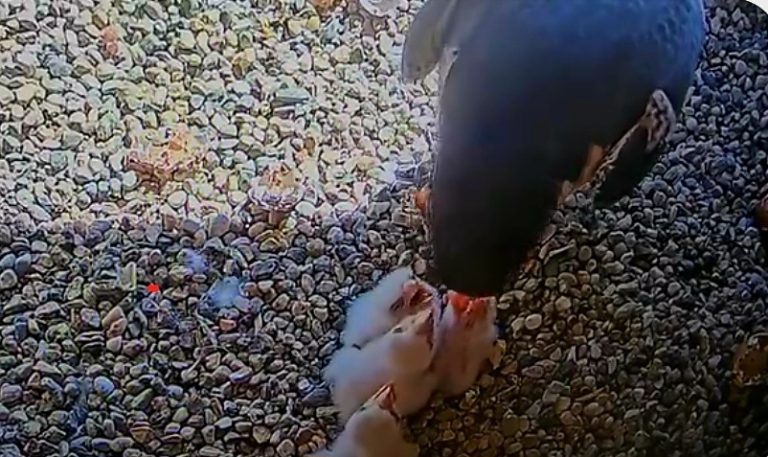
The four chicks (eyasses) are doing well, and have nearly doubled in size in the past few days! Based on when the chicks hatched, and when it would be the optimal time to band them, the Mayo Clinic Peregrine Falcon Program team has decided to band them on May 20 at 11:30 am CST. We will be broadcasting the event LIVE via Facebook, which will give you an idea of how the Midwest Peregrine Society team retrieves the chicks for the banding in a Mayo Clinic auditorium, as well as the health check and application of the bands. The names will be randomly chosen on banding day.
You can submit your name suggestions via the link to the name submission form. Name suggestions will be accepted until 5 p.m. CST on May 12. Check out more information about why we band the falcon chicks under the Banding Day tab on the website.

Four for Four...All Eggs have hatched!
At 7:38 pm tonight, the final chick hatched from its egg. Hattie and Orton are excellent parents and we are all looking forward to seeing what the Class of 2024 brings to this world. Stay tuned for more information by next week on any banding event and naming opportunities.
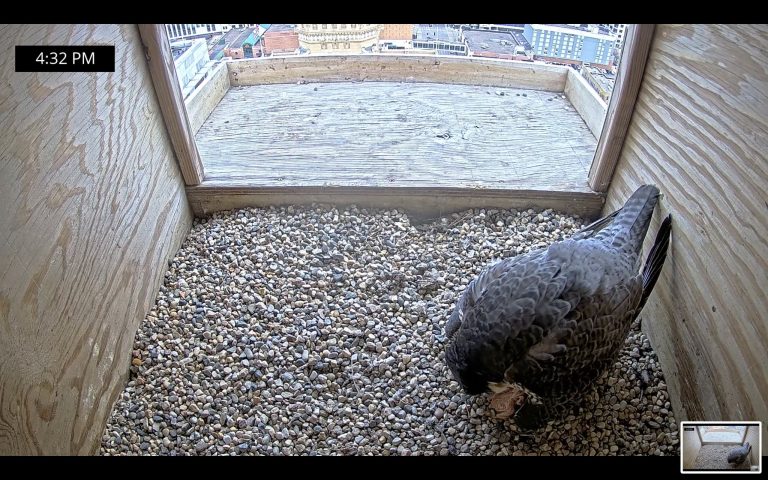
Class of 2024 … Peregrine Style!
After a long 36 days of incubation, the wait is over, and the first chick hatched late this afternoon and has started to eat well right away. Click here to view the video!

Class of 2024 … Peregrine Style!
After a long 36 days of incubation, the wait is over, and the first chick hatched late this afternoon. The remaining three eggs should hatch in the next few days, if not sooner. Stay tuned for more information about the nestlings, the banding event and how to submit names.
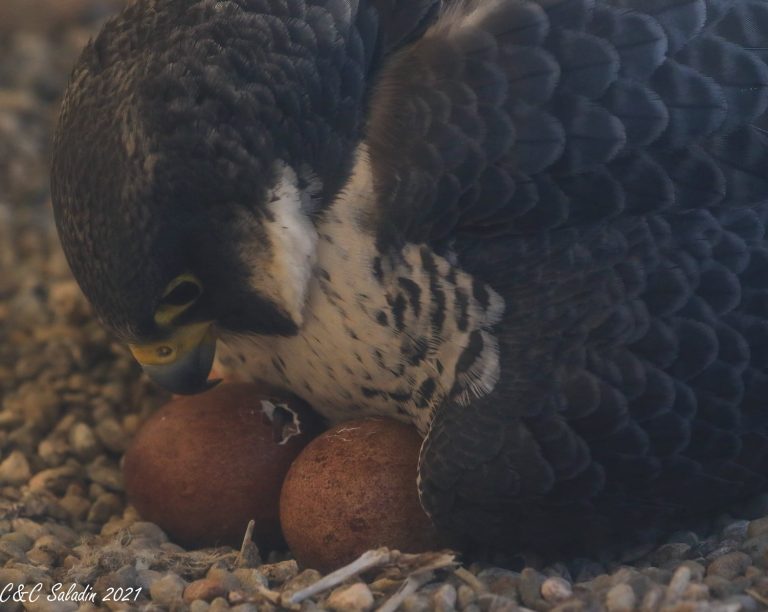
Anticipation!
Waiting for the peregrine eggs to hatch can seem like an eternity! It takes about six weeks for the first egg to hatch from when the first egg was laid, with an egg being laid about every other day or two. Incubation then begins on the day when the second to last egg is laid, with the adults keeping the eggs at a temperature between 99-100 degrees F and turning them about every 30 minutes or so. 33-35 days later, the chick will begin to use the egg tooth on their beak to chisel their way through the eggshell. During this time, the adults are often moving around quite a bit on the eggs until the chick pips its way out of the shell. You may even hear the chick vocalizing to the parents during this time, and the adult may vocalize back to the chick.
After the chick(s) hatch, you may see the adult nibble away on the eggshell remains, or they will just push the shell off to the side. It will take an hour or two for the newly hatched chick to dry off, but the adult will now begin to brood them, to keep them warm and toasty. Don’t worry if you don’t see the adult feed the chicks their first day of life, since they are feeding off of their egg sac in their abdomen. After that first day, Hattie will begin to feed very small pieces of food to the chicks-only a couple of pieces at a time, but every few hours. Watch how fast they can grow from a 30 gram newly hatched chick to one that is nearly ¾ adult size at banding time (~21 days).

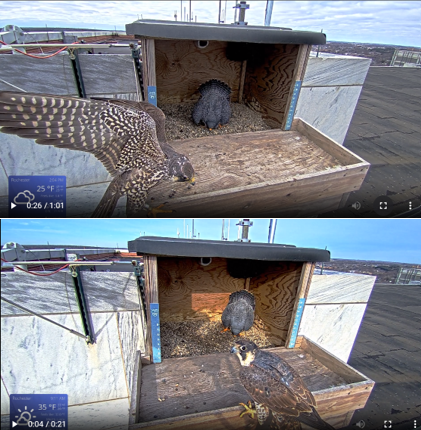
March 21, 2024 -
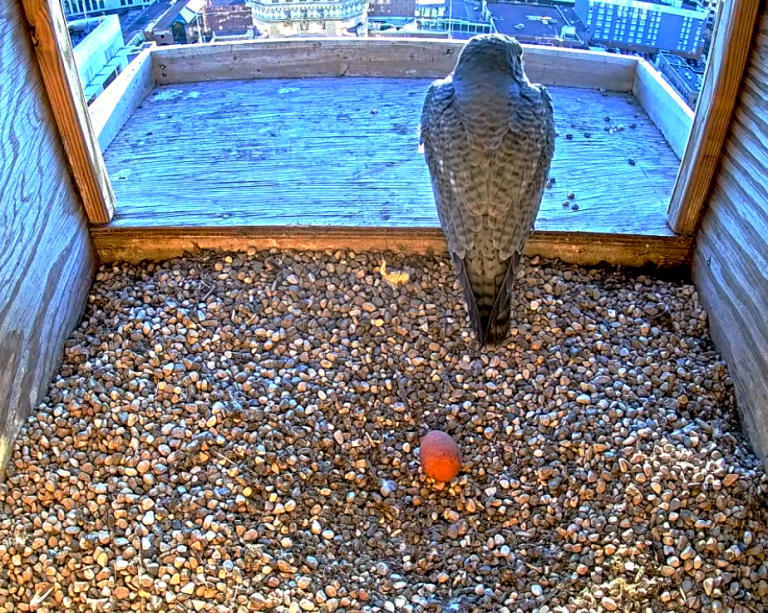
March 20, 2024 -
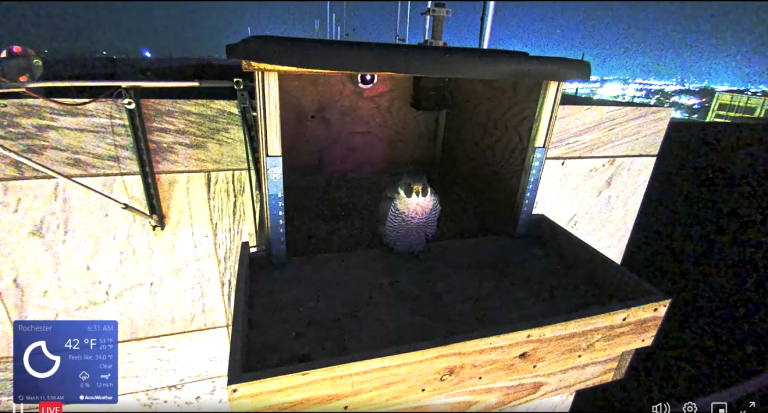
March 11 2024 - I know that we haven't shared much information lately, but there hasn't been much information to share. The falcons, Hattie and Orton, have been spending very little time in the nest box itself on the Rochester Mayo Clinic downtown campus compared to other years. We have many opinions as to why, but at the end of the day, only the falcons themselves know the answer.
The good news is that during this past weekend, things seem to have changed and both birds are spending quite a bit of time in the box, enhancing the scrape (a depression in the gravel to lay the eggs) created weeks ago and behaving more defensively about the area. This is all great news as we get closer to possible egg laying.
As things change, we'll be sharing the news here as well as on social media.

February 1 2024 - Click here to watch Jackie's Chat.

